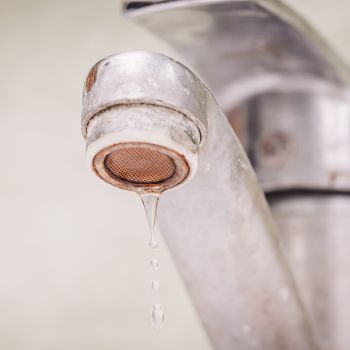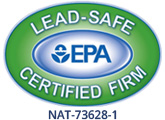Why Are My Bathroom Fixtures Rusting?
 Years after installation, you might notice that your shower fixtures and bathroom sink display rust. Discoloration is expected to some degree, as long-term exposure to water causes iron-based metals like steel to rust.
Years after installation, you might notice that your shower fixtures and bathroom sink display rust. Discoloration is expected to some degree, as long-term exposure to water causes iron-based metals like steel to rust.
Yet other factors can accelerate this process, like water traveling through older galvanized steel pipes or living in a region with hard water. Learn why rust develops on bathroom fixtures and what you can do to control the spread.
How Rust Forms on Bathroom Fixtures
Rusting on your shower fixture or sink can be a sign of:
- Metal objects kept nearby. If you store razors and cans of hairspray or shaving cream by the sink or on the edge of your tub, the metal starts to rust and may stain the material below.
- Scratched fixtures. Shower heads and sink faucets are often manufactured with a layer of chrome or nickel plating for a shinier appearance. Yet repeat wear may scratch the surface, exposing any steel underneath. The combination of water exposure and oxygen can cause rust to form.
- Rusted pipes. Areas that expel water may show signs of staining, such as the shower head. Accumulated debris may also cause a clog, resulting in slow drainage. In this second scenario, rust buildup may result in staining around your sink or shower drain. Homes built prior to 1960 are more likely to have iron or steel pipes, which corrode from the inside out.
- Hard water. A combination of mineral-heavy water and iron particles can cause shower and sink fixtures, as well as your water heater, to prematurely rust.
Reducing Rust on Your Bathroom Fixtures
A rusty shower head or sink faucet is more than an aesthetic issue. The minerals and oxidation can dry out your skin and hair, contribute to acne and other skin issues or even stain your skin, hair and clothing. If pipes are rusting throughout your home, you may also notice an off-taste whenever you drink or cook with unfiltered water from the tap.
To reduce rusting in these areas:
- Limit moisture in your bathroom. Turn on the vents to help air circulate after taking a shower and towel-dry all fixtures, so droplets of water don’t accumulate. Routinely use rust-fighting cleaners on your bathroom fixtures.
- Protect your bathroom fixtures. Apply a rust-resistant primer to shower and sink fixtures to shield the existing metal and fill in any scratches that have already formed. You can also have your fixtures waxed every couple months for a water-repelling layer of protection.
- Install a water filtration system. Water filtration systems help control chemicals, mineral deposits and bacteria that may be contributing to hard water. Also consider a water softener or iron filter, which both use a chemical process to control the mineral content of the water passing through your fixtures.
- Fix corrosion and plumbing leaks. Older, rusting iron or steel pipes won’t be resolved with a filter. Instead, address sources of leaks and corrosion or get the pipes replaced with newer copper or PEX.
- Remove the rust stains. DIY solutions include an abrasive pad with WD-40 to help scrape off stubborn orange and brown stains.
- Replace the fixtures. Consider replacing your shower head, faucet or any drains that are scratched and rusted beyond repair. Following installation, have the new fixtures coated with an anti-rust solution.
Are you concerned about rusting pipes and bathroom fixtures? Work with MJ Fahy & Sons to identify any materials that need to be replaced. Contact us to schedule service today!




